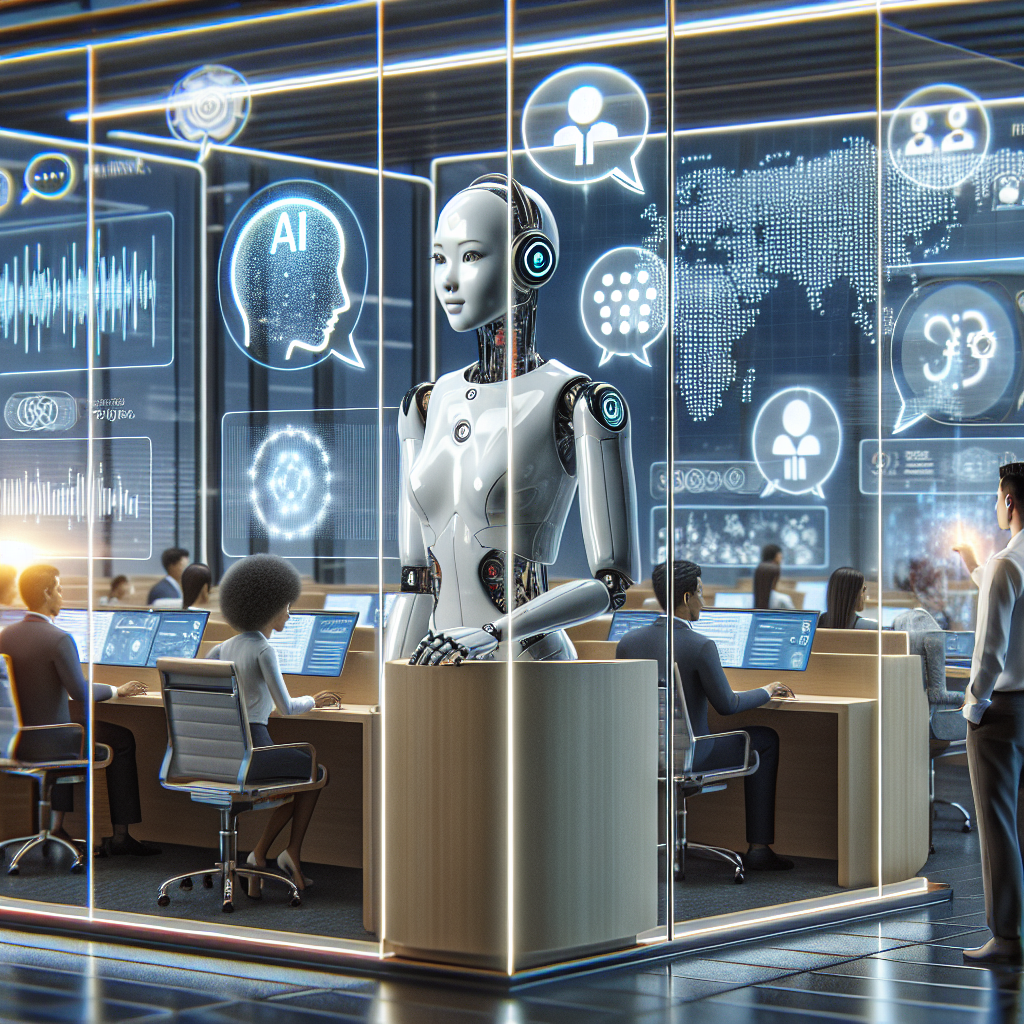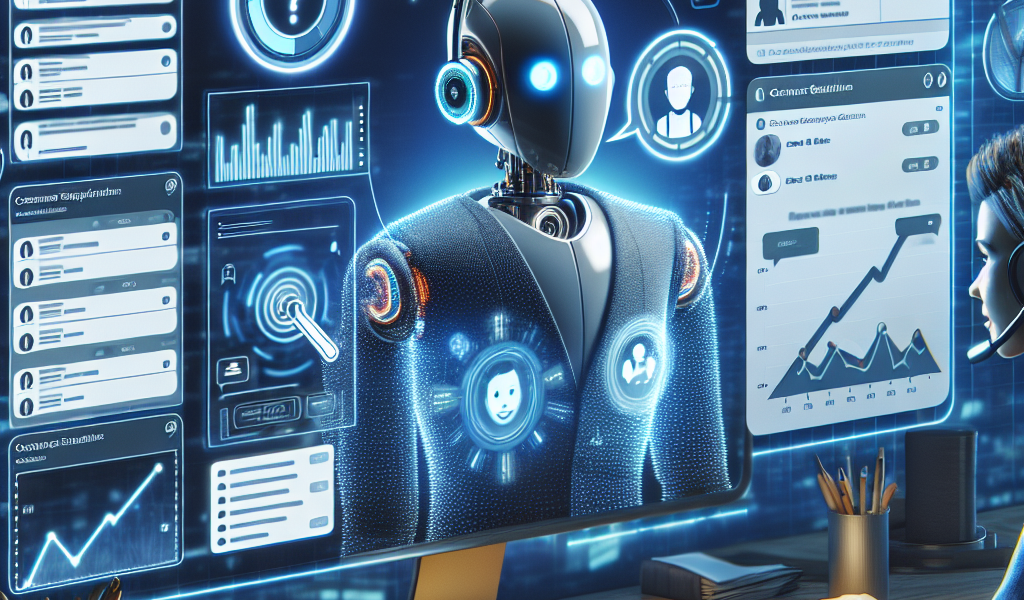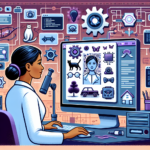-
Table of Contents
“Revolutionizing Customer Experience with Intelligent Solutions”
Introduction

Artificial Intelligence (AI) is revolutionizing customer service by providing innovative solutions that enhance efficiency, personalization, and overall customer satisfaction. Through the deployment of AI-powered chatbots, virtual assistants, and advanced data analytics, businesses can offer 24/7 support, instant responses, and tailored interactions that meet the unique needs of each customer. AI technologies enable the automation of routine inquiries, freeing up human agents to handle more complex issues, thereby improving response times and service quality. Additionally, AI-driven insights help companies anticipate customer needs, predict trends, and proactively address potential problems, leading to a more seamless and engaging customer experience. As AI continues to evolve, its integration into customer service strategies is set to further transform the way businesses interact with and support their customers.
Personalized Customer Interactions Through AI
Artificial intelligence (AI) is revolutionizing various industries, and customer service is no exception. One of the most significant advancements brought about by AI is the ability to personalize customer interactions. This transformation is not only enhancing the customer experience but also driving efficiency and satisfaction for businesses and consumers alike.
To begin with, AI-powered chatbots have become a staple in customer service. These intelligent virtual assistants can handle a wide range of inquiries, from simple questions to more complex issues, all while providing a personalized touch. By analyzing past interactions and customer data, chatbots can tailor their responses to meet individual needs. For instance, if a customer frequently asks about a specific product, the chatbot can proactively provide updates or suggest related items. This level of personalization makes customers feel valued and understood, fostering a stronger connection with the brand.
Moreover, AI is enabling more sophisticated data analysis, which is crucial for personalizing customer interactions. Machine learning algorithms can sift through vast amounts of data to identify patterns and trends. This information can then be used to predict customer behavior and preferences. For example, if a customer consistently purchases eco-friendly products, the AI system can recommend similar items or offer promotions that align with their values. This targeted approach not only enhances the shopping experience but also increases the likelihood of repeat business.
In addition to chatbots and data analysis, AI is also improving customer service through sentiment analysis. By analyzing the tone and emotion in customer communications, AI can gauge customer satisfaction and identify potential issues before they escalate. For instance, if a customer expresses frustration in an email or social media post, the AI system can flag the interaction for immediate attention by a human representative. This proactive approach ensures that problems are addressed promptly, preventing negative experiences and building customer loyalty.
Furthermore, AI is streamlining the customer service process by automating routine tasks. This allows human representatives to focus on more complex and high-value interactions. For example, AI can handle tasks such as order tracking, appointment scheduling, and basic troubleshooting. By taking care of these repetitive tasks, AI frees up human agents to provide more personalized and empathetic support. This not only improves efficiency but also enhances the overall quality of customer service.
Another significant benefit of AI in customer service is its ability to provide 24/7 support. Unlike human agents, AI-powered systems can operate around the clock, ensuring that customers receive assistance whenever they need it. This is particularly valuable in today’s globalized world, where customers may be located in different time zones. By offering continuous support, businesses can cater to a wider audience and improve customer satisfaction.
Despite the many advantages of AI, it is important to recognize that it is not a replacement for human interaction. While AI can handle many aspects of customer service, there are still situations that require a human touch. Complex issues, emotional concerns, and unique requests are best addressed by human representatives who can provide empathy and understanding. Therefore, the most effective customer service strategies combine the strengths of AI with the expertise of human agents.
In conclusion, AI is significantly enhancing customer service by personalizing interactions, analyzing data, automating tasks, and providing round-the-clock support. These advancements are not only improving the customer experience but also driving efficiency and satisfaction for businesses. As AI technology continues to evolve, it will undoubtedly play an even more integral role in shaping the future of customer service.
AI-Driven Chatbots for 24/7 Support
Artificial intelligence (AI) is revolutionizing various industries, and customer service is no exception. One of the most significant advancements in this field is the development of AI-driven chatbots, which are transforming the way businesses interact with their customers. These chatbots are designed to provide 24/7 support, ensuring that customers receive timely assistance regardless of the time of day. This round-the-clock availability is particularly beneficial in our increasingly globalized world, where customers may be located in different time zones.
The implementation of AI-driven chatbots offers numerous advantages for both businesses and customers. For businesses, these chatbots can handle a high volume of inquiries simultaneously, reducing the need for large customer service teams and thereby cutting operational costs. Moreover, chatbots can be programmed to handle a wide range of queries, from simple questions about product availability to more complex issues such as troubleshooting technical problems. This versatility makes them an invaluable asset for companies looking to streamline their customer service operations.
For customers, the benefits are equally compelling. AI-driven chatbots provide instant responses, eliminating the frustration of long wait times often associated with traditional customer service channels. Additionally, these chatbots are available at any time, making it convenient for customers to seek assistance whenever they need it. This level of accessibility is particularly appealing to younger generations, who are accustomed to instant gratification and expect quick resolutions to their problems.
Transitioning from traditional customer service methods to AI-driven chatbots also enhances the overall customer experience. These chatbots are capable of learning from previous interactions, allowing them to provide more personalized and accurate responses over time. By analyzing data from past conversations, chatbots can identify patterns and predict customer needs, leading to more efficient and satisfactory interactions. This ability to continuously improve and adapt is a key factor in the growing popularity of AI-driven chatbots.
Furthermore, the integration of natural language processing (NLP) technology has significantly improved the effectiveness of AI-driven chatbots. NLP enables chatbots to understand and interpret human language more accurately, allowing for more natural and engaging conversations. This advancement has helped to bridge the gap between human and machine interactions, making it easier for customers to communicate their needs and receive appropriate assistance.
Despite the numerous benefits, it is important to acknowledge that AI-driven chatbots are not without their limitations. While they are highly effective at handling routine inquiries, more complex issues may still require human intervention. However, many businesses are adopting a hybrid approach, where chatbots handle initial interactions and escalate more complicated cases to human agents. This ensures that customers receive the best of both worlds: the efficiency of AI and the empathy of human support.
In conclusion, AI-driven chatbots are playing a pivotal role in enhancing customer service by providing 24/7 support. Their ability to handle a wide range of inquiries, coupled with instant response times and continuous learning capabilities, makes them an invaluable tool for businesses. As technology continues to advance, we can expect AI-driven chatbots to become even more sophisticated, further improving the customer service experience. While they may not completely replace human agents, their integration into customer service strategies is undoubtedly a step towards a more efficient and customer-centric future.
Predictive Analytics in Customer Service
Artificial intelligence (AI) is revolutionizing various industries, and customer service is no exception. One of the most transformative applications of AI in this field is predictive analytics. By leveraging vast amounts of data, predictive analytics enables businesses to anticipate customer needs, streamline operations, and ultimately enhance the overall customer experience.
Predictive analytics involves using historical data, machine learning algorithms, and statistical techniques to forecast future events. In the context of customer service, this means predicting customer behavior, preferences, and potential issues before they arise. For instance, by analyzing past interactions, AI can identify patterns that suggest a customer might be dissatisfied or likely to churn. This allows companies to proactively address concerns, thereby improving customer retention and satisfaction.
Moreover, predictive analytics can help businesses optimize their resources. For example, by forecasting peak times for customer inquiries, companies can ensure they have adequate staffing levels to handle the increased volume. This not only reduces wait times for customers but also alleviates the pressure on customer service representatives, leading to a more efficient and pleasant experience for both parties.
In addition to resource optimization, predictive analytics can enhance personalization in customer service. By understanding individual customer preferences and behaviors, AI can tailor interactions to meet specific needs. For example, if a customer frequently purchases a particular type of product, the system can recommend similar items or offer personalized discounts. This level of customization not only delights customers but also fosters loyalty and encourages repeat business.
Furthermore, predictive analytics can play a crucial role in identifying and mitigating potential issues before they escalate. For instance, if a product is frequently returned due to a specific defect, AI can flag this trend early on. This enables the company to address the problem promptly, whether by improving the product or providing additional support to affected customers. By resolving issues proactively, businesses can prevent negative experiences and maintain a positive brand reputation.
Another significant advantage of predictive analytics in customer service is its ability to enhance decision-making. By providing data-driven insights, AI empowers customer service managers to make informed decisions that improve overall performance. For example, by analyzing customer feedback and service metrics, managers can identify areas for improvement and implement targeted strategies to address them. This continuous improvement cycle ensures that customer service remains responsive and effective.
Moreover, predictive analytics can facilitate more effective training and development for customer service representatives. By identifying common challenges and areas where agents may struggle, AI can help design targeted training programs that address specific needs. This not only enhances the skills and confidence of the representatives but also ensures that customers receive high-quality support.
In conclusion, predictive analytics is a powerful tool that is transforming customer service by enabling businesses to anticipate and meet customer needs more effectively. Through proactive issue resolution, resource optimization, personalized interactions, and data-driven decision-making, AI is enhancing the overall customer experience. As technology continues to evolve, the potential for predictive analytics in customer service will only grow, offering even more opportunities for businesses to delight their customers and stay ahead of the competition.
Conclusion
Artificial Intelligence is significantly enhancing customer service by providing personalized experiences, improving response times, and increasing efficiency. AI-driven chatbots and virtual assistants offer 24/7 support, handling routine inquiries and freeing human agents to tackle more complex issues. Machine learning algorithms analyze customer data to predict needs and preferences, enabling proactive service and tailored recommendations. Additionally, AI tools streamline workflows and automate repetitive tasks, reducing operational costs and improving overall service quality. As AI technology continues to evolve, its role in customer service is expected to expand, further transforming the customer experience.





